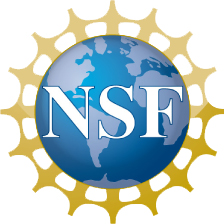
 Three current CSE students are among the 2,000 nationwide to be offered 2015 Graduate Research Fellowships from the National Science Foundation (NSF). Graduate students Rachel Marty and Alexandria Shearer and graduating senior Max Shen were selected from among roughly 16,500 applicants this year. In addition, CSE undergraduate Antonella Wilby was a runner-up in the national competition, receiving an Honorable Mention for work in the field of robotics and computer vision. Shearer and Wilby are both in CSE Prof. Ryan Kastner's research group, which is already home to three NSF graduate fellows: Dustin Richmond, Perry Naughton, and Alric Althoff. Max Shen works in the bioinformatics group of CSE Prof. Pavel Pevzner, while Rachel Marty is also pursuing a Ph.D. in bioinformatics.
Three current CSE students are among the 2,000 nationwide to be offered 2015 Graduate Research Fellowships from the National Science Foundation (NSF). Graduate students Rachel Marty and Alexandria Shearer and graduating senior Max Shen were selected from among roughly 16,500 applicants this year. In addition, CSE undergraduate Antonella Wilby was a runner-up in the national competition, receiving an Honorable Mention for work in the field of robotics and computer vision. Shearer and Wilby are both in CSE Prof. Ryan Kastner's research group, which is already home to three NSF graduate fellows: Dustin Richmond, Perry Naughton, and Alric Althoff. Max Shen works in the bioinformatics group of CSE Prof. Pavel Pevzner, while Rachel Marty is also pursuing a Ph.D. in bioinformatics.
With its emphasis on support of individuals, the NSF program offers fellowship awards directly to graduate students selected through a national competition. If accepted, the award provides three years of financial support within a five-year fellowship period ($34,000 annual stipend and $12,000 cost-of-education allowance to the graduate institution) for graduate study that leads to a research-based master's or doctoral degree in science or engineering.
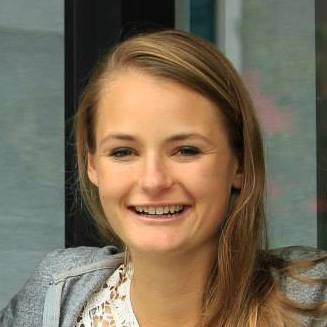 Rachel Marty (left) is a CSE alumna (BS '14) who earned her computer science degree with a specialty in bioinformatics. She graduated magna cum laude even while playing varsity collegiate basketball. Marty has done bioinformatics internships at Thermo Fisher Scientific (and Life Technologies, which it acquired) as well as at Illumina, where she developed an "application to centralize the experience of gene exploration for researchers." Her research interests include cancer genomics, genomic algorithms and population genetics. Marty has done research with both CSE Prof. Vineet Bafna (in the field of genomic algorithms) and with Hannah Carter at the UC San Diego School of Medicine's Division of Medical Genetics (on cancer genomics). "I will likely choose one of them to be my advisor at the end of the year," she says, when the rotation period of her doctoral program ends. Marty also CSE Prof. Andrew Kahng, who recommended her for the fellowship; as an undergrad, she took an algorithms class with Kahng, who also supervised an independent study project when she interned at Life Technologies. "He has played a prominent role in getting me where I am," notes Marty, who plans to finish her Ph.D. in 2019.
Rachel Marty (left) is a CSE alumna (BS '14) who earned her computer science degree with a specialty in bioinformatics. She graduated magna cum laude even while playing varsity collegiate basketball. Marty has done bioinformatics internships at Thermo Fisher Scientific (and Life Technologies, which it acquired) as well as at Illumina, where she developed an "application to centralize the experience of gene exploration for researchers." Her research interests include cancer genomics, genomic algorithms and population genetics. Marty has done research with both CSE Prof. Vineet Bafna (in the field of genomic algorithms) and with Hannah Carter at the UC San Diego School of Medicine's Division of Medical Genetics (on cancer genomics). "I will likely choose one of them to be my advisor at the end of the year," she says, when the rotation period of her doctoral program ends. Marty also CSE Prof. Andrew Kahng, who recommended her for the fellowship; as an undergrad, she took an algorithms class with Kahng, who also supervised an independent study project when she interned at Life Technologies. "He has played a prominent role in getting me where I am," notes Marty, who plans to finish her Ph.D. in 2019.
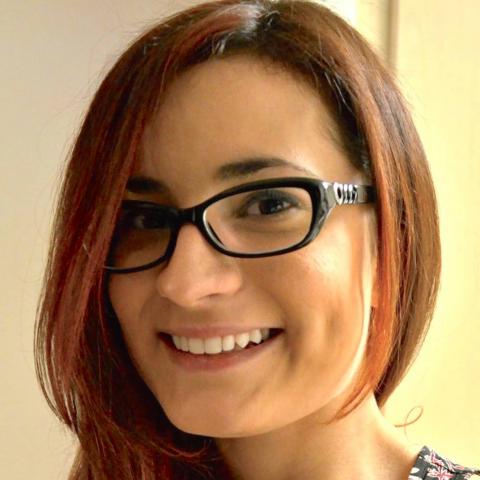 Alexandria Shearer (right) is a Ph.D. student working on applications in heterogeneous computing. Less than two weeks ago, she was selected to receive a one-year UC San Diego Frontiers of Innovation Scholarship to continue her work on aerial LiDAR scanning of Mayan ruins. The FISP fellowship will cover Shearer over the summer and partially cover some equipment and travel costs related to her research, while the NSF stipend covers her primary expenses during the school year and the tuition allowance is paid directly to UCSD. Shearer arrived at UC San Diego in 2013 after getting her B.S. in computer science and engineering from Santa Clara University's School of Engineering, where she graduated as the top senior in computer engineering. Shearer expects to complete her Ph.D. in 2018. Among past honors, she was a SWE ViaSat Scholar in 2012, and a Google Anita Borg Memorial Scholar in 2011, the same year she won an NSF Grace Hopper Celebration Scholarship.
Alexandria Shearer (right) is a Ph.D. student working on applications in heterogeneous computing. Less than two weeks ago, she was selected to receive a one-year UC San Diego Frontiers of Innovation Scholarship to continue her work on aerial LiDAR scanning of Mayan ruins. The FISP fellowship will cover Shearer over the summer and partially cover some equipment and travel costs related to her research, while the NSF stipend covers her primary expenses during the school year and the tuition allowance is paid directly to UCSD. Shearer arrived at UC San Diego in 2013 after getting her B.S. in computer science and engineering from Santa Clara University's School of Engineering, where she graduated as the top senior in computer engineering. Shearer expects to complete her Ph.D. in 2018. Among past honors, she was a SWE ViaSat Scholar in 2012, and a Google Anita Borg Memorial Scholar in 2011, the same year she won an NSF Grace Hopper Celebration Scholarship.
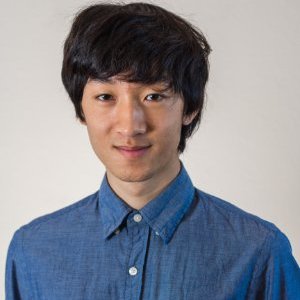 Max Shen (left) will graduate this June with a B.S. in computer science and a specialization in bioinformatics. He is a research assistant in the group of CSE Prof. Pavel Pevzner, and for the past year has been a content contributor to Pevzner's Rosalind platform for learning bioinformatics and programming through problem-solving. For Rosalind, Shen designs and implements bioinformatics programming assignments onto a live website with randomized input generation and scoring. Rosalind is used in undergraduate bioinformatics courses, and also by students enrolled in Pevzner's massive open online courses on Coursera, including courses on bioinformatics algorithms. In addition to being a research assistant, Shen has also been a TA and tutor in CSE, a software engineering intern at Qualcomm, and a software engineer at Illumina. He was also a research assistant in the UC San Diego School of Medicine's Radiology Imaging Laboratory, thanks to which Shen may be the only computer science student who is also certified to operate a magnetic resonance imaging (MRI) machine.
Max Shen (left) will graduate this June with a B.S. in computer science and a specialization in bioinformatics. He is a research assistant in the group of CSE Prof. Pavel Pevzner, and for the past year has been a content contributor to Pevzner's Rosalind platform for learning bioinformatics and programming through problem-solving. For Rosalind, Shen designs and implements bioinformatics programming assignments onto a live website with randomized input generation and scoring. Rosalind is used in undergraduate bioinformatics courses, and also by students enrolled in Pevzner's massive open online courses on Coursera, including courses on bioinformatics algorithms. In addition to being a research assistant, Shen has also been a TA and tutor in CSE, a software engineering intern at Qualcomm, and a software engineer at Illumina. He was also a research assistant in the UC San Diego School of Medicine's Radiology Imaging Laboratory, thanks to which Shen may be the only computer science student who is also certified to operate a magnetic resonance imaging (MRI) machine.
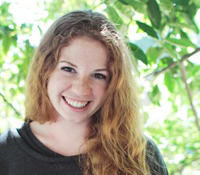 Honorable Mention recipient Antonella Wilby is a graduating senior. She has been active for over two years in the Engineers for Exploration program co-directed by CSE's Kastner. Wilby graduates in June and will start grad school in CSE this fall, having just accepted an invitation to join Shearer in Kastner's research group. She also recently received a National Geographic Young Explorer grant for her work to document the endangered vaquita, a rare species of porpoise found primarily in the Gulf of California.
Honorable Mention recipient Antonella Wilby is a graduating senior. She has been active for over two years in the Engineers for Exploration program co-directed by CSE's Kastner. Wilby graduates in June and will start grad school in CSE this fall, having just accepted an invitation to join Shearer in Kastner's research group. She also recently received a National Geographic Young Explorer grant for her work to document the endangered vaquita, a rare species of porpoise found primarily in the Gulf of California.
According to NSF, the fellowships are "a critical program" in its overall strategy to develop the globally-engaged workforce necessary to ensure the nation's leadership in advancing science and engineering research and innovation."
Learn more about the NSF Graduate Research Fellowship Program.

